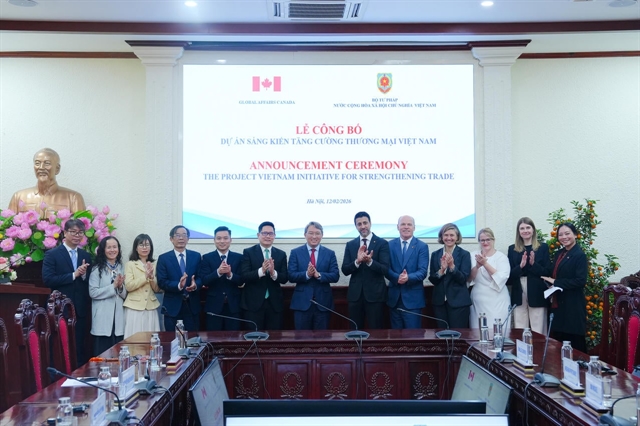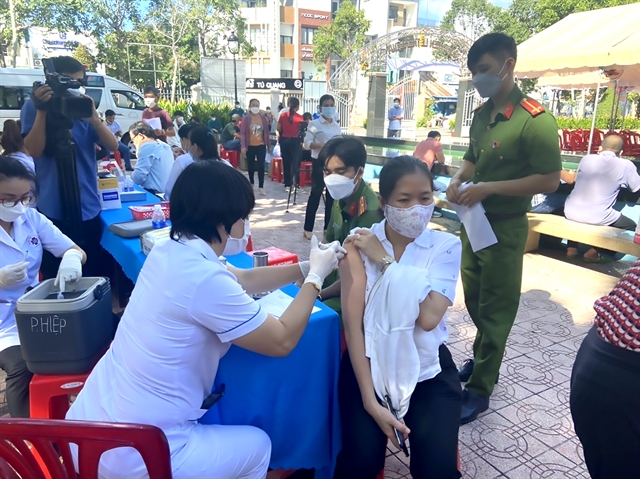.jfif) Opinion
Opinion

 |
| A booster dose of a COVID-19 vaccine is administered to a resident of the southern province of Bà Rịa – Vũng Tàu. — VNA/VNS Photo Hoàng Nhị |
Dr Nguyễn Thu Anh, Việt Nam's country director of Woolcock Institute of Medical Research, University of Sydney, talks to Việt Nam News about lessons from the COVID-19 pandemic and the measures to take in the new normal context.
What are the lessons learnt from the last two years of the pandemic to better handle global outbreaks in the future?
Việt Nam, a tropical middle-income country, has been handling infectious disease outbreaks quite well, with many years of experience facing numerous diseases. Before COVID-19, the national health system was "rehearsed" and overcame many outbreaks, especially SARS in 2003 and H5N1 in 2009. Việt Nam successfully contained the disease in those cases. However, the COVID-19 pandemic is a new challenge not only for Việt Nam but also for every other country because its scale is bigger than the previous pandemics, exceeding the health care system's handling capacity of all countries, not just Việt Nam's. In the future, there will be other infectious diseases, we just don't know what their scales will be yet.
The first and foremost lesson from this pandemic is to stay informed. In the pandemic, information changes constantly and scientists also need to update. We didn't know what the virus was, and new variants kept emerging. In that case, we need to be capable and equipped to stay updated with those information changes.
Data on the outbreak in the country also needs to be updated in real-time for quick responses. Those data must be accurate and analysed in a way that can help policymakers make decisions. It is not helpful if the numbers are too general. For example, Việt Nam now has around 11.4 million people who have been infected with COVID-19, but that figure takes into account cases from a very long time ago and it doesn't bear much meaning today, which would be very difficult for policymakers, ministries, departments, businesses and organisations to make decisions.
Information is very important, and that requires efforts from those working on the frontline, people working at the backend in collecting and analysing the data, and good technological infrastructure for real-time updates. This includes data from medical testing machines and patient and contact databases – meeting the requirements for accuracy, speed and comprehensiveness. Information should not only come from the health sector because a pandemic is a multi-sectoral issue. Therefore, all need to cooperate in data collection and analysis and develop a dashboard to reach decisions.
When all have data and reach a decision, communication is important. There are two important things to note in this stage. The first is to have a healthy environment for interaction between leaders, scientists, communication agencies and the people, meaning that there should be evidence-based, trusting and sincere messages, where people can be transparent about what they do and do not know. Sincere messages will reach people's hearts and they will listen to and take actions accordingly. Threatening and fear-inducing messages may work well in the early stage, but that effect decreases quickly and can even be counter-effective.
In terms of communications, I think Việt Nam has done well in mobilising different channels and people – in addition to the officials, there were also the youth and influencers – but we could do better as this was only maintained for some time before people seemed tired and no longer made efforts.
Another lesson from the pandemic is that it is hard not to make mistakes because then we were facing an enemy that we didn't have the experience to deal with, and didn't have enough weapons in our hands. Therefore, we should acknowledge this, then learn and adjust immediately rather than criticising and punishing them, as it could cause a reaction among people and those directly combating the disease. For example, when medical workers get so tired that they quit the frontline, it could be counter-effective if punishment is imposed on them, as they were truly exhausted.
We also noticed that in a pandemic, inequality is usually very pronounced, and it is difficult to address this matter. During COVID-19, for example, people in the working age group could get the jab because they know how to use technology, or because their employers registered for vaccination, or even because they have the ability to physically access the vaccination centres. Meanwhile, disadvantaged groups of people, such as senior citizens, people in remote areas, or even foreigners in Việt Nam, found it hard to get access to vaccines. These vulnerable groups could be infected and die. Lockdowns ensued when fatalities increased, and then people who were vaccinated could not go to work or to school. Therefore, if the more vulnerable groups are not protected, it will affect everyone else as well. One of the most important principles in a pandemic is that protecting the vulnerable is protecting the entire community.
In the future, different diseases will require different preventive and control measures, but overall, if people have a healthy lifestyle, they will enjoy better immunity against illness. They can achieve this through regular exercise and an appropriate diet – without drinking or smoking. The fatality rate would be much lower. Even for people with underlying medical conditions, if they take medications regularly and sufficiently, that would protect them from severe illness and fatal risks.
Last but not least is the health system, which plays a crucial role in a pandemic. Previously, the preventive health system can handle smaller-scale outbreaks. Those of a major scale, however, requires the whole health system to respond, which leads to overloading. The coordination, procurement of biologicals and equipment, and establishment of diagnostic laboratories and field hospitals met with many challenges due to limited resources, and capacity and frameworks were not adequate. Major outbreaks require different responses. Therefore, an appropriate legal framework should be established promptly to allow the timely implementation of measures in future pandemics or medical or biological disasters.
Another thing to note in case of an infectious disease is urban planning. Major cities, especially areas with a huge population, were severely affected by COVID-19. It is because people live in small spaces with limited ventilation. Therefore, urban planning needs to consider this point to ensure safety and economic development in the cities.
Many people feel reluctant to get the second booster dose, what is your opinion on this matter?
The Omicron strain is currently still present, while there might be other subvariants that we have not detected yet. We need to continue monitoring because it is very infectious, although the illness is not as severe as the Delta or Alpha.
In this context, reports have shown that the elderly and people with underlying medical conditions face greater risks, therefore the recommendation is to vaccinate these people. The Ministry of Health recommends that everyone should get an additional dose, while people aged 50 or above should have two booster doses.
We know that vaccination works. However, according to a new study in South Africa published in the New England Journal of Medicine, the vaccine effectiveness wanes after about three to four months. People might be afraid of the side effects of vaccines, but they need to consider whether to face these effects or the risks of severe illness and death.
People in the high-risk groups should receive boosters on a periodical basis, at least every six months, if no new vaccine is available. In that case, the government or the health ministry need to estimate the vaccine need to procure sufficient vaccine doses for these groups. It is not easy because we will need statistics about senior citizens, those with underlying medical conditions or who are immuno-compromised.
Scientists are also studying to develop new vaccines with longer effectiveness, which would address not only the Omicron variants but also other viruses in the same family. I believe that we need to continue observing the developments in other countries, and if these vaccines truly have longer and better effectiveness, we can consider procuring them for senior citizens.
My opinion is that the strategy should shift from vaccinating the entire population to targeting vaccination. At the same time, the elderly should have their underlying illnesses addressed to keep themselves in stable condition and have better immunity against infection.
We should also stay up to date with new information to make prompt responses in cases where there are more severe variants or new vaccines or medicines for treatment. While now those might only be necessary for people with critical illness, we need to prepare our actions and capacity for future scenarios to address uncertainty brought by SARS-CoV 2 or other emerging infectious diseases. — VNS




